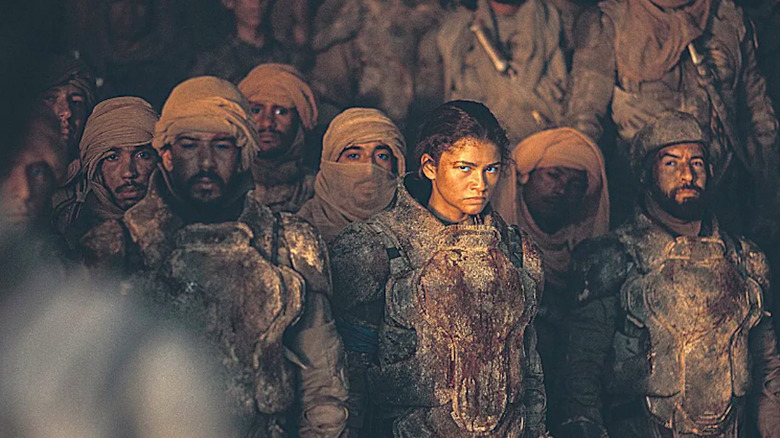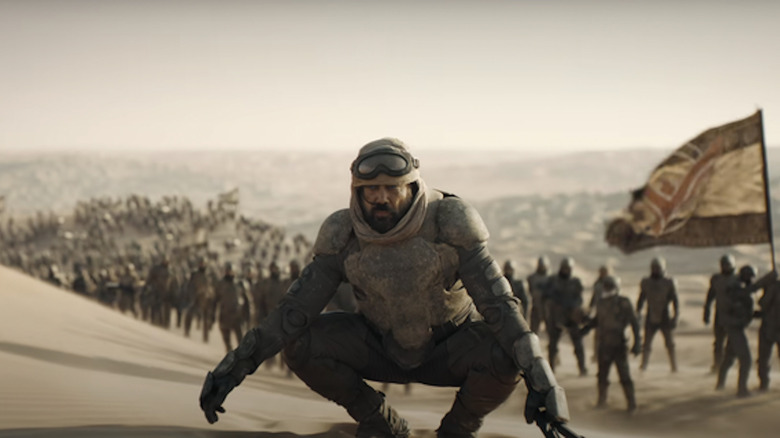The Cast Of Dune 2 Learned Their Lines In Both English And The Fremen Language
Frank Herbert's "Dune" series is as dense with detail as some of the most beloved science fiction and fantasy universes ever created. The cultural nuances of the various houses — from the regal rationality of the Atreides clan to the unapologetic savagery of the Harkonnens — have been fully thought through, and expanded upon throughout the numerous books. Like J.R.R. Tolkien's Middle-earth saga or everything that's grown out of Gene Roddenberry's "Star Trek," you don't have to immerse yourself in the minutiae to enjoy these works — at least, not until they dive into the narrative reeds and turn into glorified fan service.
Herbert got there somewhere between "God Emperor of Dune" and "Heretics of Dune," so I'm curious to see how faithful Denis Villeneuve and his successors are willing to be to the author's increasingly involved text. The "Dune" series isn't YA pabulum that mimics and travesties more sophisticated genre books. For better or worse, they delve deep into the beliefs and social mores of these disparate civilizations. Sticking with "Dune" is a commitment, and, given the sheer physical scope/budgetary indulgence of the first two films, I can't help but wonder how long they can keep viewers engaged before the movies no longer work as standalone epics.
This remains to be seen, but, thus far, Villeneuve and his cast understand the commitment, and seemingly respect the hardcore fans' buy-in. Heck, they learned a whole fictional language to do full justice to the material!
The form and function of Chakobosa
According to Tanya Lapointe and Stefanie Broos' "The Art and Soul of Dune: Part Two," Villeneuve continued the development of Herbert's invented language for the Fremen. Getting what Herbert called "Chakobsa" not just right, but naturally spoken required the participation of linguists David J. Peterson and Jessie Peterson. The duo wrote phonetic translations for the actors, and also provided audible references to ensure the actors knew precisely how to speak a language that, y'know, only exists in Herbert's books (much like Klingon dialect in a "Star Trek" movie or show).
There also had to be a uniformity to the pronunciations in order to sell the Fremen as a believably indigenous culture. The responsibility for this fell to dialect coach Fabien Enjalric, who gave Chakobsa a much-needed verisimilitude for actors and viewers alike. "Denis doesn't want Chakobsa to get in the way of the performance," said Enjalric. "On the other hand, my mission is to make sure that the pronunciation is right. So, it's about hitting the right balance."
It was also about attaining a degree of prosody to the utterances, which, as far as Enjalric is concerned, the Petersons absolutely nailed.
The Fremen language in Dune
There were many turns of Fremen phrases concocted by the Petersons, but one line really leapt out at Enjalric. "It's an expression in Chakobsa meaning 'You're insane.' It's literally 'Zaihaash Lek,' meaning, 'You drink sand!' It makes sense, because you'd be crazy to drink sand on Arrakis." Granted, you'd be crazy to drink sand in, say, Scottsdale, Arizona, but it does sound pretty cool in context.
There were also common Arrakis phrases that the actors had to master (e.g. "Sa fadla," which means "hello"), and the cast, believing in Villenueve's vision of Herbert's first installment of the "Dune" saga, brought it off with aplomb. The two-part film is easily one of the most engrossing science fiction epics ever brought to the screen, and this is in large part because everyone from Villeneuve down to his linguists were determined to do Herbert's novel justice. "Dune Messiah" feels like a million years away.


